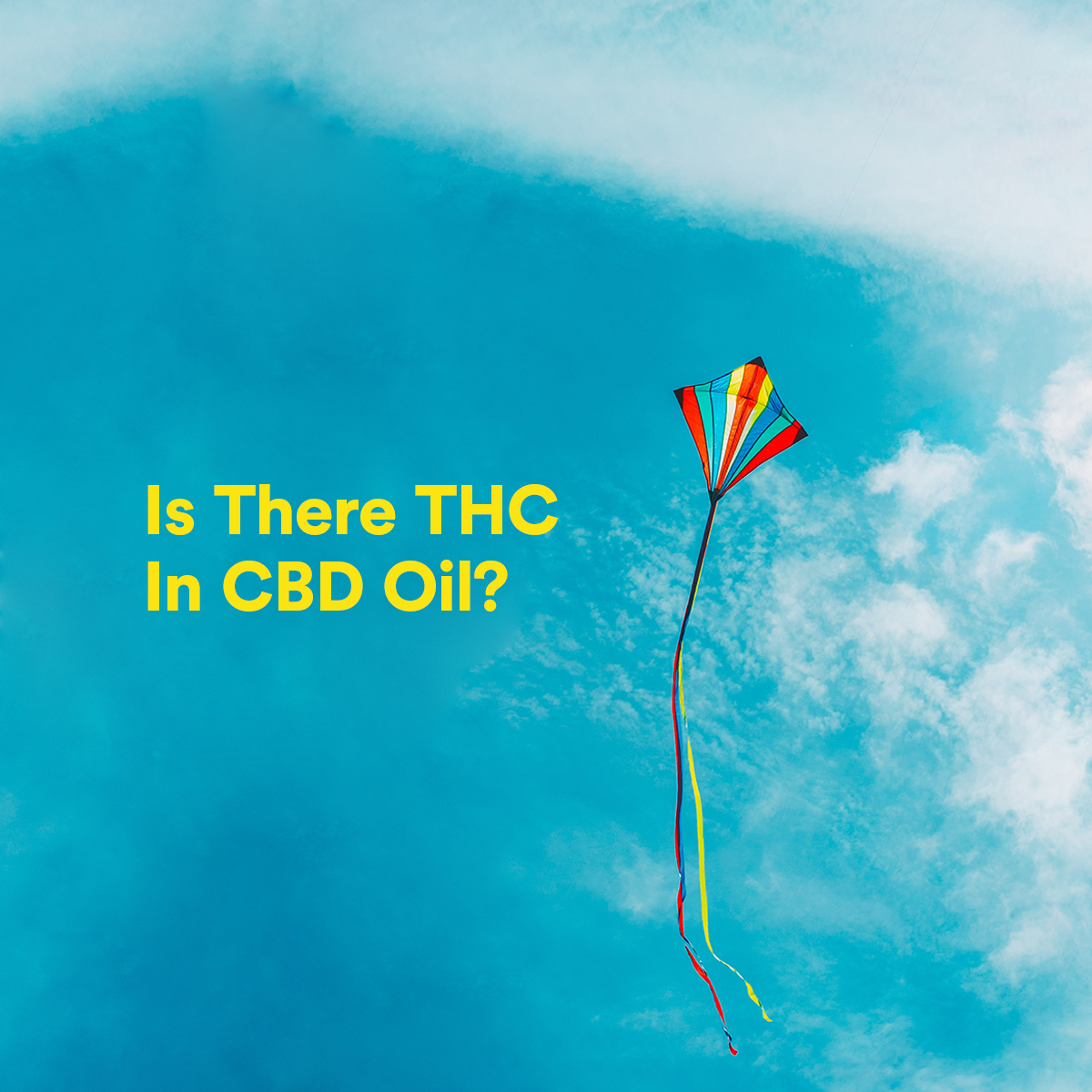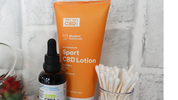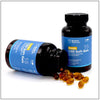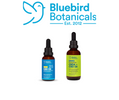Is There THC in CBD Oil?

CBD has gained significant popularity over the past decade for those exploring hemp-based products and its reputation as the non-intoxicating cousin of THC, the marijuana cannabinoid that causes the “high.” However, given that CBD, like THC, is an active ingredient derived from cannabis, many users tend to have one key question when buying CBD oil for the first time: “Is there THC in this?”
The answer is: sometimes. It depends entirely on what kind of CBD or THC products you’re consuming. But before you panic, we’re here to tell you why THC isn’t as bad as it might sound.
Join us as we walk through the following:
- What exactly THC is
- How much of THC is in hemp products
- Why THC can make a positive contribution to the benefits of CBD
Note: For a quick primer on this topic, check out our video, “Demystifying THC.”
What exactly is THC? How is it different from CBD?
THC, like CBD, is a cannabinoid. Cannabinoids are chemical compounds found abundantly in the cannabis plant. Both CBD and THC are present in all types of the Cannabis sativa plant, including both hemp and marijuana.
Hemp is primarily used to make hemp oil, fabrics, food, rope, and, of course, CBD. This is because hemp generally has low levels of THC - less than 0.3% by dry weight per federal regulations - and higher levels of CBD. Recreational and medical cannabis, by contrast, are used for their high concentration of THC.
CBD and THC work by interacting with the endocannabinoid system found in vertebrates. This can happen in a few different ways. These plant cannabinoids can affect the levels of naturally occurring cannabinoids in the body (endocannabinoids) by occupying enzymes.
They interact with cannabinoid receptors in the body, influencing various processes. We say “in some fashion” because this interaction can happen in different ways. It can function like a “lock and key” situation where the molecule nestles nicely into the receptor. Or, it can be a case where the molecule actually acts as something partially wedged in that lock, not fully locking into place but preventing another activator from attaching itself.
Given that both CBD and THC come from the same plant family, it makes sense that these two molecules are related. And they’re closely related, in fact. CBD and THC share a nearly identical molecular mass, weighing in at 314.469 g/mol and 314.464 g/mol, respectively. CBD and THC are also “structural isomers,” which is really just a fancy way of saying they boast the exact same building blocks in their chemical makeup. Both CBD and THC have the same chemical formula - 21 carbon atoms, 30 hydrogen atoms, and two oxygen atoms. They’re just laid out in a slightly different arrangement.
These similarities have earned CBD and THC the nickname “sister molecules.” But while CBD and THC are sisters, they’re not identical twins. While the two compounds contain the same atomic content, THC’s molecule contains a closed cyclic ring, while CBD has an open Hydroxl grouping. Think of it like a fenced-in yard: THC’s gate is kept closed while CBD’s is left ajar.
And the slight variation in chemical arrangement makes a world of difference in how these molecules act and interact with the body.
The brain-body connection
THC gets you high because it likes CB1 receptors and will readily bind with them. It doesn’t interact with the brain stem itself, so it won’t trigger a shutdown of autonomic processes like breathing or heartbeat. But it will tell the brain, “This feels really good.”
CBD is often explored for its potential role in supporting overall balance in the body.
without any impact on mental processes or clarity.
This is because CBD doesn't directly set off either CB1 or CB2; rather, it steps in and alters these receptors' ability to bind with cannabinoids. It essentially changes how other cannabinoids can "fit" into these receptors, preventing other cannabinoids from fully locking in as they might otherwise do in the absence of CBD.
Essentially, how it binds affects the mind: Because CBD does not interact with the portion of the nervous system found in the brain and spinal cord, it does not result in psychoactive effects - "it will not get you high".
Despite sharing almost identical molecular structures, CBD and THC actually produce nearly opposite effects on the human body as they interact very differently with the CB1 receptors in the brain.
Agonists and antagonists
THC is an agonist, or activator, of the CB1 receptor. When this receptor is blocked (by another type of drug, for instance), cannabis will not actually be able to get a person high. This makes it apparent that the CB1 receptor is the site in the brain that produces intoxication.
When THC interacts with the CB1 receptor, it can result in increased blood flow to the prefrontal cortex region of the brain. The prefrontal cortex is responsible for decision-making, personality expression, and other high-level executive functions, like motor skills, so these are the sorts of functions that are impacted when THC is present. THC intoxication can affect any of these cognitive processes to varying degrees, depending on the person.
CBD, on the other hand, is actually considered an antagonist, or exactly the type of compound that could potentially block the CB1 receptor site from receiving and interacting with the THC molecule. CBD doesn’t bind with CB1 receptors. So, not only will CBD not get you high — no matter how much you consume — but it also can also balance out the impacts of THC when present.
Do all CBD products have THC? Can I get one without THC?
While there are many different types of hemp and CBD products sold online, full-spectrum hemp extracts are among the most popular. Full-spectrum extracts contain the entire array of terpenes and cannabinoids, including up to 0.3% THC as stipulated by the legal definition for hemp in the 2018 Farm Bill.
Hemp companies like Bluebird Botanicals provide extensive third-party batch reports so that customers can verify the exact amount of THC present in their full-spectrum products. This is important because many customers, especially those who are new to hemp-derived CBD products, often wonder whether THC will present any challenges for them with drug testing or potential intoxication.
Likewise, THC is naturally present in full-spectrum products within legal limits, contributing to the full range of cannabinoids in hemp. It contributes handily to the “entourage effect,” which describes the increased power of all of the cannabinoids and terpenes working together versus their effects when isolated from each other.
However, there are many reasons why you might be seeking to avoid THC. Some CBD users have extra sensitivities to THC or may undergo regular drug screenings. If you are one of these users, fear not - there are plenty of cannabis products on the market that contain non-detectable levels of THC.*
First, let’s talk about broad-spectrum products. Broad-spectrum hemp extracts contain the entire array of cannabinoids but less than 0.01% THC. They’re also typically stripped of many of the terpenes that are commonly present in full-spectrum products.
Similarly, CBD isolate products also contain non-detectable levels of THC. These products have been completely stripped of all other cannabinoids and terpenes, leaving behind 99% pure CBD.
Related Article: Full-Spectrum Vs Broad-Spectrum
Why is 0.3% the limit for THC?
Hemp is legally defined in the 2014 Farm Bill as “Cannabis sativa that contains less than 0.3% total THC by dry weight.” However, the 0.3% threshold was established much earlier in a 1976 research paper by Canadian scientist Dr. Ernest Small.
In his paper titled Small, E., and Cronquist, A. 1976. A practical and natural taxonomy for Cannabis. Taxon 25: 405-435, Cannabis sativa was defined as with “Δ9-THC comprising less than 0.3% (dry weight) of upper, younger leaves, and usually less than half of cannabinoids of resin,” and Cannabis indica as “with Δ9-THC comprising more than 0.3% (dry weight) of upper, younger leaves, and frequently more than half of cannabinoids of resin.”
It’s important to note that “total THC” in the cannabis plant refers to the amount of both THCA (raw THC, which converts into THC when heated) and THC present. “By dry weight” means that the percentage of THC present is calculated in relation to the total plant weight when harvested and dried.
Dr. Small specified that this division between sativa and indica cannabis varieties was not intended to measure the plant’s capacity to get users high. He stated, “Over the years, I have had many inquiries regarding whether the 0.3% criterion was based on the potential for abuse – i.e. the possibility of using hemp to get high. No, it was not – the criterion was based on the pattern of variation in the real world: it happens that for thousands of years, people have selected plants for fiber (subsp. sativa; low-intoxicant plants) and for marijuana (subsp. indica; high-intoxicant plants), and my studies simply revealed this pattern.”
However, after his research paper was published, the Canadian government adopted this threshold as the basis of their hemp legislation, and in 2014, the U.S. followed suit.
Related Article: Why Is 0.3% The Legal Limit For THC In Hemp/CBD?
Can you get high or fail a drug test from taking CBD?
So if there’s THC in hemp products, albeit in small amounts, can users get high or fail a drug test after consuming CBD? While both scenarios are uncommon, they may still occasionally happen.
Medical professionals, civil servants, teachers, and athletes, in particular, often undergo rigorous drug screenings due to the nature of their careers. Although more and more states are legalizing medical and recreational cannabis, many employers and institutions still have a zero-tolerance policy. Most standard drug tests that screen for marijuana read “hot” if THC is detected. If you’ve been using CBD products for an extended period of time, it is possible that the THC may build up in your system and ultimately show up on a drug screening.
Likewise, while most CBD users don’t react to the small amount of THC present, some people may have extra sensitivities to THC and experience psychoactivity after using a full-spectrum product. This sensitivity depends almost entirely on your genetic makeup.
For these users who are concerned about drug testing or heightened sensitivity to THC, broad-spectrum and CBD isolate products are a good alternative for avoiding THC while still being able to consume the same amount of CBD.
Why is THC content labeled on hemp products?
The Colorado Department of Public Health and Environment recently released new regulations requiring hemp companies to clearly label the THC milligram content per serving and per container on every CBD product. If you’ve recently purchased Bluebird CBD, you may have noticed this addition to our product labels.
Rest assured - even with this new callout, the THC content of our products has not changed. Per state regulations and federal law, our full-spectrum products contain less than 0.3% THC by dry weight. We have always adhered to the highest standards of quality assurance and safety, and regulatory compliance remains our top priority in order to ensure our customers can confidently trust our products.
Have more questions? We’re here to help! Reach out to our Customer Care Team at info@bluebirdbotanicals.com or call us at 720-726.5132.









